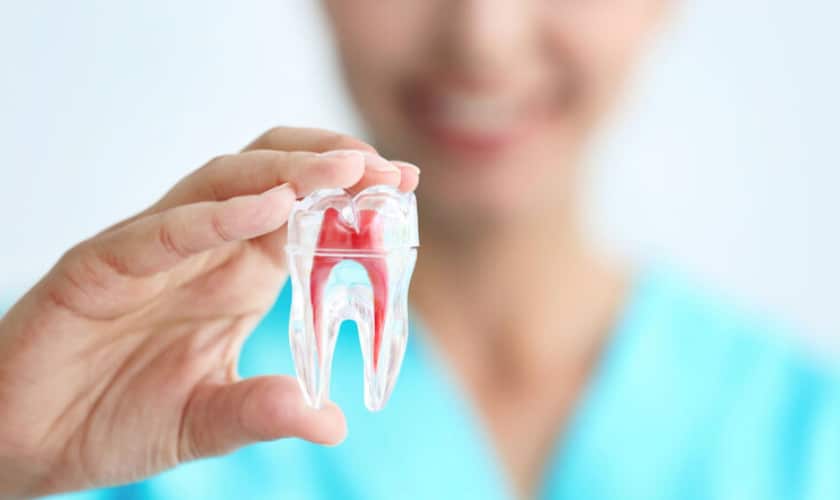In this blog, we’ll delve into a topic that might send shivers down the spine of many – root canals. While the mere mention of a root canal may evoke fear, it’s essential to understand that this procedure is often a necessary and beneficial solution to various dental issues.
What Is Done During Root Canal?
During a root canal, a dentist removes the infected or damaged pulp from the tooth, cleans the root canals, and shapes them for filling. The space left by the removed pulp is filled with a biocompatible material. This procedure prevents the spread of infection, alleviates pain, and preserves the natural tooth.
Afterward, a crown may be placed to restore the tooth’s strength and functionality. Root canals are a standard dental intervention to save teeth that would otherwise face extraction. Regular check-ups can help identify the need for timely root canal treatment.
8 Reasons that Signal Root Canal is Needed
Every year in the United States, over 15 million root canals are done, which means more than 41,000 are performed each day, according to information from the American Association of Endodontists (AAE). Let’s explore eight reasons you might need a root canal backed up by proven facts and shed light on the importance of this dental intervention.
- Deep Decay: One of the primary reasons for needing a root canal is deep decay or cavities that have penetrated the pulp chamber of the tooth. The pulp contains nerves and blood vessels, and when decay reaches this area, it can lead to severe pain and discomfort. According to the American Association of Endodontists (AAE), untreated tooth decay is a common cause of pulp infection, necessitating root canal treatment.
- Trauma or Injury: Accidents or injuries to the teeth can result in cracks or fractures that expose the pulp. This exposure can allow bacteria to enter the pulp chamber, leading to infection and inflammation. The Journal of Endodontics reports that dental trauma is a significant factor in the need for root canal therapy.
- Repeated Dental Procedures: Teeth that have undergone multiple dental procedures, such as fillings or crowns, may eventually require a root canal. The stress and trauma from repeated interventions can compromise the tooth’s health, necessitating more extensive treatment.
Research in the International Endodontic Journal suggests a correlation between repeated dental procedures and the need for root canal therapy.
- Cracked or Fractured Teeth: Cracks or fractures in the teeth can extend into the pulp, causing pain and making the tooth susceptible to infection. Root canal treatment becomes essential to address the damage and preserve the tooth. The Dental Traumatology journal highlights that cracked teeth are a common reason for endodontic intervention, including root canal therapy.
- Swollen Gums and Abscesses: An abscess, often indicated by swollen gums and a pimple-like bump on the gums, signifies a severe infection. Root canal therapy is crucial to remove the infected pulp and alleviate the associated pain and swelling.
The Journal of the American Dental Association reports that root canal treatment effectively resolves periapical abscesses and reduces the risk of recurrence.
- Prolonged Tooth Sensitivity: Persistent sensitivity to hot or cold temperatures, even after avoiding triggers, could be a sign of pulp inflammation. Root canal treatment aims to address this sensitivity by removing the damaged pulp.
The Journal of Endodontics notes that prolonged tooth sensitivity is a common symptom in cases requiring root canal therapy.
- Darkening or Discoloration of the Tooth: A tooth that has darkened or changed color may indicate damage to the pulp. Root canal treatment can help restore the tooth’s health and appearance.
The European Journal of Oral Sciences highlights tooth discoloration as a clinical sign associated with pulp necrosis, necessitating root canal therapy.
- Genetic Factors: Some individuals may be genetically predisposed to dental issues, including problems with tooth pulp. In such cases, a root canal may be recommended to address inherited dental conditions. The Journal of Dental Research suggests a genetic basis for susceptibility to dental caries and pulp diseases, influencing the need for root canal treatment.
How to Avoid the Pain During Root Canal?
To minimize pain during a root canal, follow these tips:
1. Communicate openly with your dentist about anxiety or concerns.
2. Discuss sedation options for relaxation and according to your medical condition.
3. Use over-the-counter pain relievers as directed.
4. Practice good oral hygiene to prevent infections.
Final Insights
As our experienced dentist in Abilene has witnessed over four decades, root canals play a crucial role in preserving teeth and alleviating pain associated with various dental issues. If you’re experiencing any of the signs mentioned above, it’s essential to consult with a dental professional promptly. Remember, a root canal might just be the key to saving your smile and maintaining optimal oral health for years to come.
